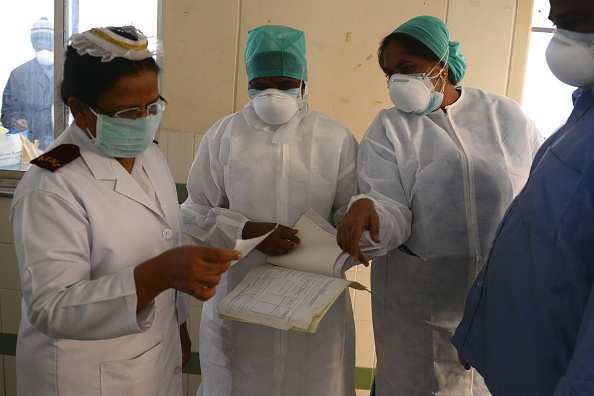India bullish on AI 9-year-old Karan Singh- a lung cancer patient undergoing treatment since 11 years, recalls the number of times he had to carry the folders bulging with photocopies of medical reports, the repeated blood tests in different hospitals, and the sleepless nights caused by painful side effects of drugs, chemotherapy and radiation india bullish on ai
Today, even after all these years of treatment, Karan has never heard about electronic health records (EHR). HIMSS Health Information and Technology Resource Library defines Electronic Health Record (EHR) as a longitudinal electronic record of patient health information generated by one or more encounters in any care delivery setting. This includes patient demographics, progress notes, problems, medications, vital signs, past medical history, immunisations, laboratory data and radiology reports.
Imagine the impact of EHR on Karan’s course of treatment if systems had flagged early detection of cancer and provided insight into the most effective methods of treatment based on data collected as electronic health records from a huge number of patients.
While the governments continue to give hope, Kerala is the only state in India which has successfully collected and stored electronic health records of 2.58 crore people through its ‘eHealth project’. The state government initiative allows patients to walk into any government hospital without carrying any papers.
Sharing insight about Kerala’s eHealth project, Dr Shabeer Ali, Managing Director of HODO, a Trivandrum-based software company that develops electronic health records, said, “86 government hospitals in the state have implemented the eHealth project, and 2.58 crore people have been empanelled in this system. In Kerala, while the public sector has taken this initiative to collate health information, the private sector is new at adopting such technology.”
The National Digital Health Blueprint (NDHB) which was proposed in 2019 plans to establish and manage the health data and infrastructure required for its seamless exchange, promoting adoption of open standards and developing several digital health systems that span from wellness to disease management. Interestingly, the NDHB also aims at “leveraging information systems already existing in the health sector.”
Fortunately today, healthcare experts and clinicians in India do understand the potential of artificial intelligence and big data, however, implementation of standardised electronic health records can only be seen in radiology, billing and registration systems.

With more than 75% of outpatients and more than 60% of inpatients in India being treated in private healthcare facilities, the government urgently needs to bring these establishments on-board for using EHR.
Understanding the potential of EHR
According to Dr. M. W. Ghori, Executive Director at Medical and Health Information Management Association, a block-chain technology-driven EHR has the potential to transform Indian healthcare, placing the patient at the centre of the healthcare ecosystem and increasing the security, privacy, and interoperability of health data.
Currently, the Hospital Information System (HIS) software is used in India. Adoption of EHR in hospitals automates and streamlines the clinician’s workflow and its adoption can be a means in which hospitals tap on to improve healthcare delivery by capturing structured healthcare information.
Only after we have the data can we think of artificial intelligence to become a reality as the power of AI lies in its ability to analyze extremely large amounts of data coming in from a spectrum of sources – including EHRs, consumer devices, radiology and sensor data.
“If we feed in the data of all public hospitals, we could create our robust decision support system (DSS) tool to help newly passed out doctors, this will be a big boost to the accuracy of diagnosis and treatment. We could impact clinical outcomes, predict seasonal outbreaks and NCDs,” added Prof. Rajendra Pratap Gupta.
He further said that this could help in predicting, planning and providing timely intervention to prevent, treat and avoid the aggravation of the disease burden.
Wockhardt Group of Hospital’s CHIO, Girish Koppar, believes EHR adoption will see the evolution of predictive treatment than reactive treatment and help in leveraging on AI and ML technologies which can be life- saving.
India’s stand on EHR implementation
In the latest review report prepared by the ministry of electronics and information technology (MeitY) titled Adoption of Electronic Health Records: A Roadmap for India highlighted that the government hospitals and dispensaries have very little ICT infrastructure with only some major public hospitals, such as the All India Institute of Medical Sciences (AIIMS) and the Postgraduate Institute of Medical Education and Research (PGIMER), have computers and connectivity.
Except for a handful of large healthcare organizations in India, there has not been a major effort towards EHR implementation. Smaller hospitals will find EHR implementation a major cost hurdle, feels Swanand Prabhutendolkar, Sr. Vice President – Healthcare Data Management at CitiusTech.
“Electronic health records were never a technology challenge but an adoption challenge which only dissolves when clinicians realise the potential of EHR or when there is mandate either from a top management or from the government,” said Prashant Singh, Director and Chief Information Officer at Max Healthcare.
Max Healthcare which uses Vista EHR system is currently leveraging speech to text technology to capture data for reducing the medical error in medicine administration. The hospital is also evaluating technologies to make EHR available on the doctor’s tablet or mobile for better patient care and data capturing.
Apollo, Columbia Asia, Narayana Health, Shankara Nethralaya and Aravind Eyecare are the few healthcare players that are working on AI solution for patient care.

Different hospitals can have varied budgets and approaches to the adoption of electronic healthcare records. Now while data can be available in many formats, hence, it is important to mandate some standards for the data to be analysable and to achieve interoperability.
Deen Sulbigar Ali Ahamed, Group Head of IT, Columbia Asia Group of Hospitals, emphasised on the need for significant adoption of common EHR data standards such as FHIR to ensure seamless transfer of patient data between hospitals.
He said, “Gaps in EHR data for any given patient (for example, data from a particular provider is missing) can significantly reduce the credibility of data and practitioners would be unwilling to make clinical decisions based on EHR.”
There has to be greater emphasis on the quality of the available clinical data without errors which is critical to enable widespread adoption. The review report prepared by the MeitY revealed infrastructure creation, policy and regulations, standards and interoperability as challenges.
Prashant Singh while sharing similar concerns said, “EHR standards on the ground are nowhere. Government of India has not mandated those records as of now and it is available as a part of minimum data sets for EHR.”
According to him, everyone first has to follow one standard and then only we can think of interoperability. “There needs to be a clear mandate i.e., capturing at least a minimum data set, otherwise I don’t see its probability in the near future.”
Can incentives scale EHR adoption?
EHR implementation which is a long-drawn effort requires significant spends on technology, people and data digitization. While few private hospitals do have some kind of EHR system in place, the majority of hospitals are still functioning on handwritten reports.
This non-adoption of an EHR system is further delaying the collection of the required amount of data. One of the measures suggested by Prof. Rajendra Pratap Gupta is that the MoH should get a basic ‘functional EHR’ developed, host it on a secure cloud (Health Information Exchange), and give it for free to clinicians and hospitals.
“Smaller hospitals will find EHR implementation a major cost hurdle. Government incentivization for technology adoption may be needed, to help these organizations overcome the cost challenge,” said Swanand Prabhutendolkar.
The experts believed that well-defined incentives for providers could really scale up adoption of EHR and also encourage hospitals to share patient data towards common EHR systems.
Realigning the focus
Today, everyone is talking on how artificial intelligence could revolutionise the healthcare delivery but the reality outlines the major gaps in the implementation of electronic medical records. With the slow approach towards the adoption of EHR systems for capturing data, we are not even at the starting point of using technologies like artificial intelligence, forget about big data.
“I do not believe that Big Data is a notion that hospitals should focus on. It would be more prudent to build analytics that can quantify clinical quality and help improve care protocols and outcomes,” stated Swanand Prabhutendolkar.
The Meaningful Use incentive programs which were started by the US more than a decade ago, have their initial focus on EHR deployment and clinical quality measurement. It is only in the third phase of the program that the focus changed to deeper goals like clinical decision support, accountable care and patient engagement.
Israel-a small country with a population of just 9 million is a good example to learn the importance of investing in health data. Their healthcare system has been paperless for the last 20 years, which have helped achieve major insights on adrenal failure, haemoglobin levels and colon cancer. Even though the EHR systems of different hospitals are not the same, they are still very well connected. Last year, Israel’s cabinet approved a $276 million investment in digital health, focusing primarily on commercializing and otherwise deriving value from the country’s medical databanks.
Citing Israel’s example Prof. Rajendra Pratap Gupta said, “If we give financial incentive, we would just have to spend about Rs 100 crores to set up a secure Health Information Exchange (HIE). So, for a cash strapped government looking at creating jobs, AI and big data in healthcare is a phenomenal opportunity.”
Big Data and AI can play an important role in improving healthcare outcomes but only once we have some of the foundational data and analytics pieces in place. India which is seeing a drastic rise in heart diseases, diabetes and pulmonary diseases needs to strengthen its healthcare providers with EHR systems to effectively study the disease patterns and reduce the burden.






























































